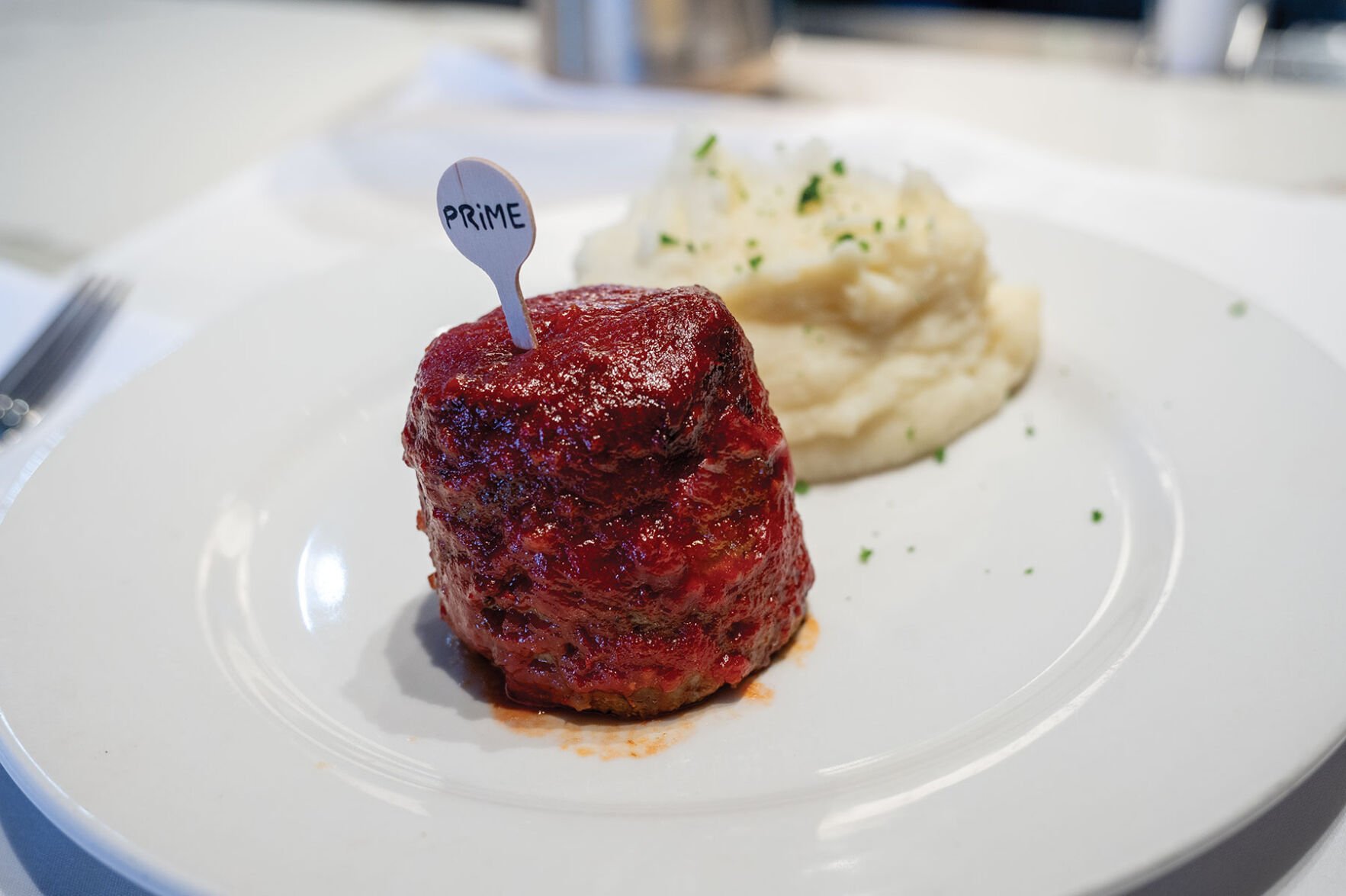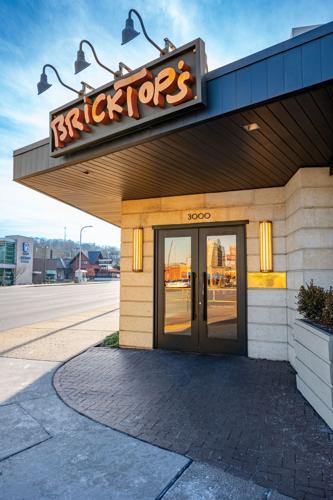
BrickTop’s
Late in the Friday lunch rush, a BrickTop’s waiter returns for a second time, ready to take the table’s order. He offers more information about the trout — just landed from Idaho, it was in the water less than 24 hours ago — and the lobster roll, a seasonal special from New England.
“Just hang the menu off the edge of the table when you’re ready,” he tells the table, aware that too much attention can be as annoying as too little. “I’ll be over.”
The service has been so attentive that one member of our party is convinced the restaurant was somehow tipped off about a visit from the media. Five entrées, two appetizers, one soup, one sushi roll and two desserts later, the check totals $45 apiece (including gratuity). A skillet chocolate chip cookie finishes off a meal so cozy, so familiar, so predictable that — held alongside the small-plate menus and chef-driven concepts dominating Nashville’s restaurant scene — it feels as fresh as the Palm Beach Salad.
Food writing loves hype. Fantastic new restaurants offering unique meals make easy, fun stories. But exclusive focus on these spots may also further the impression that spending money to curate a new dining room is somehow more impressive than printing money with a dining room full of gracious regulars and the career servers who know their names.
No better avatar exists right now for the mentality defining Nashville’s restaurant scene than Sean Brock. The accomplished chef has teased, opened, closed and waylaid kitchens and pop-ups across the city since opening Husk in 2013. (He left the restaurant in 2019.) Ego is a critical factor for creative pursuits, often providing the confidence necessary to bet on one’s own mettle. It can also require its own nourishment, demanding bigger, better, newer, more ambitious propositions. These risks have rained blessings down on Nashville diners and wrought their own kind of fatigue for in-the-know gourmets chasing the newest reservations. Diners end up narrowing their scope between elevated Gulf standards, wine-driven Lao cuisine and heirloom Appalachian prix-fixe when it’s time to book a birthday or anniversary.

Prime meatloaf
BrickTop’s bets on the exact opposite formula for success. Rather than fumble with their phone under the table to avoid asking embarrassing questions about gelée, orgeat or nettle, a BrickTop’s diner likely has not just encountered but actually eaten every item on the menu — whether at BrickTop’s or elsewhere — before they set foot into the restaurant. The skillet chocolate chip cookie sundae, for example, has been on the menu for decades. Familiar does not mean boring or unsatisfying — the restaurant leverages predictability as consistency and comfort, BrickTop’s crowning strength.
An approachable menu also shifts the restaurant’s gravity onto service — an obvious strength actively cultivated by the restaurant group — rather than a boundary-pushing kitchen taking culinary risks. Rather than meeting me at eye level to describe the concept of a small plate, the waiter calmly recommends meatloaf, perhaps the most conventional meal of the American Century. It’s delicious. Dirtying white linens with prime sirloin, lobster tail, lump crab meat, poached shrimp and fire-roasted artichokes, it’s not the restaurant but the diner who starts to feel pretentious. That’s part of the indulgence.
Yelp and Google describe BrickTop’s as “New American” — a term often applied to any menu that is neither clearly a steakhouse nor obviously dedicated to a single international cuisine. New American menus list items like salmon, fish tacos, fried shrimp, fancy burgers and salads with meat. While steakhouse-inspired, BrickTop’s builds on a surf-and-turf core with headline dishes from different global culinary traditions: French, Mexican, Italian and Japanese are all represented, the latter with a dedicated menu of BrickTop’s-original sushi rolls. All have been tempered to the American palate — sushi, for example, comes without shiso, an essential aromatic found across Tokyo. Wines come from Europe and Australia, but mostly California.
The strategy yields stark results. After the price of admission, which easily falls below $30 for a non-drinking customer with a modest appetite, the West End dining room is diverse in every sense of the word. At our Friday lunch hour, young parents and their newborn baby sit a few tables from a couple easily in their 70s, celebrating something. The room is shared almost evenly by Black and white patrons, a rare scene in the Nashville food world and a sharp contrast to the typical chic dinner service in Germantown or East Nashville, which attract diners between 25 and 50 years old and skews white. Affable servers and private booths make BrickTop’s a comfortable restaurant to dine solo.
“You can make consistent money and work for people you like, people who like you, and people who take care of you,” says Aisha McWeay. “I think that’s probably why BrickTop’s has survived the way it has. People here are servers and bartenders by choice — I know many who have been at BrickTop’s for more than 10 years. They’re homeowners with children, who are providing for their families.”
McWeay, now a lawyer and adjunct professor at Vanderbilt Law School, helped open BrickTop’s in Cool Springs in 2012. She had just graduated from Vanderbilt Law School, passed the bar and secured a full-time job at the public defender’s office, but she wanted an income boost so she could buy a house. She worked a few years at BrickTop’s and became a homeowner. McWeay remains close with several former co-workers and praises Tony Grippo — then her manager, now BrickTop’s chief operating officer — as the best boss she has ever had.
“A lot of folks you see coming into the restaurant are coming in forever,” McWeay says. “You know their families. You know certain things. The culture and code encourages you to be a human — interact with people in a natural way, and they will want to come back.”
The BrickTop’s empire includes a dozen locations in vacation towns and major cities across Missouri, Tennessee, Alabama, North Carolina, South Carolina and Florida — including the 7,300-square-foot Bridgestone Tower space formerly home to BrickTop’s sister restaurant The River House, now operating as yet another BrickTop’s. Without flinching, a fellow Nashville restaurant owner referred to BrickTop’s founder-owner-CEO Joe Ledbetter as “without question the most successful restaurateur in the Southeast.”
Grippo responded to the Scene’s cold call with a quick text — “What do you want to know?” — before passing the interview request to Leigh Anne Balsman at the company’s local corporate office.
“We’re honored by your interest in featuring us,” Balsman wrote. “However, as part of our company policy, we don’t participate in interviews.”
Why would they? The restaurant is already full.





